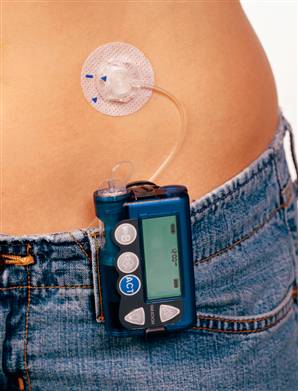 I saw Chris back for her diabetes follow up today. In my last 2 years here, I have gotten to know her pretty well and have come to appreciate her sense of humor. She also happens to live hear us, and we owe her for actually bringing our dog home when Chloe ran away that one time.
I saw Chris back for her diabetes follow up today. In my last 2 years here, I have gotten to know her pretty well and have come to appreciate her sense of humor. She also happens to live hear us, and we owe her for actually bringing our dog home when Chloe ran away that one time.I have also gotten pretty used to her antics. Inevitably, she comes in with minimal glucose readings, one or two, every couple of days and certainly inadequate to provide trends, instead of the 3-4 daily for a patient on a 4-shot a day program. Her a1c remains poorly controlled. She asked me today: "What about an insulin pump?"
Now, I happen to love the insulin pump. If I had type 1 diabetes, that would be my way to go. But I get asked this a lot, and certainly get frequent referrals for this too.
"Patient with poorly controlled diabetes, refer for insulin pump.."
I share with Chris what the research has shown. It's a nifty device that may help with hypoglycemia, and with pregnant patients with diabetes (I just wish the dang companies weren't making so much money from my poor patients!). But the main advantage of the pump is that it provides more lifestyle flexibility to the patient in terms of insulin administration. It is NOT meant to bring now the A1c. In fact, a recent metaanalysis comparing SQ insulin to the pump showed only a 0.2% A1c lowering in a type 1 population, and virtually no A1c benefit in a type 2 (in fact the trend was that it got worse). In other words, if a patient isn't controlled with the shots, don't expect it to happen on a pump. Obviously, a metaanalysis is a composite of many studies and is very sound statistically, but every patient is different. But that's what the research shows. And it makes sense; the pump requires data for it to adequately do its job. Without periodic glucose results it's flying blind. It's a pain in the butt checking so frequently and counting one's intake so meticulously, but the rewards are real and for most, worth it; but only a patient can decide what's worth the trouble, never the doctor on the patient's behalf.
And so I tell her, if she isn't able to be more regular with her checks and insulins, it is very unlikely the pump will give her better results. Conversely, I have had many worsen their A1c readings because many actually stop checking completely when they get on a pump, thinking that it is all 'cruise control' now. So I left it to her to ponder. If she wants to give it a try, she could but unless she changes her ways, her A1c will likely remain high. She's a very intelligent adult, and is a very caring mother and so eventually she will have to make her choices.
I hope I can help her make the right one.

1 Comments:
99% of my T1 friends love their pumps eventhough sometimes they may have some trouble with it... but from what i hear... they will never give up their pumps ever for MDI again... in fact... majority of them says that the pump gives them way more control and less hypos than on MDI
The pic you showed looks like a medtronic pump... if i'm not mistaken, it has a build in CGMS on it to show the trends / bg direction right? of course... nothing beats finger testing
Post a Comment
<< Home